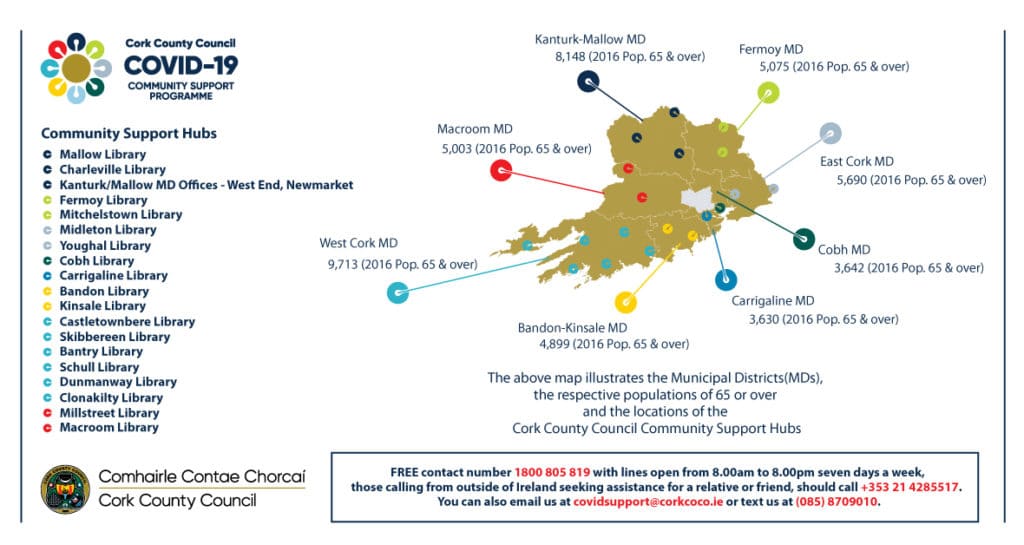
PERMANENT CULTURE
Principal 4 – Our 10,000 Trees (Apply Self-Regulation and Feedback)
Remember those 10,000 trees being planted around Clonakilty – the plan from way back before the lock-down? I wanted to revisit my last theme ‘Obtain a Yield’ with the example of the tree planting, and spoke to Istvan Markuly, our local permaculture expert, who is voluntarily managing the planting of those trees; about 8000 trees have been planted this spring and the rest will go in this autumn. Speaking to Istvan, he related the importance of trees in providing the (much-needed!) yield of clean air, in spaces that up to now have either been mowed lawn or overgrown unkempt bramble. Over their lifetime, they will provide many other yields for their community too; by creating communal spaces for walking, benefitting physical and mental health, being a source of grounding, and some will even provide fruit, nut and flower crops. For Istvan, the project has kept his passion for Permaculture satisfied whist not being able to travel to work on his other permaculture projects in Hungary and Jordan.
The tree planting also ties in nicely to this month’s principal, ‘Apply Self-Regulation and Feedback’, and comes up at a time when it has really been on my mind. It reminds us that within any project it is essential to have a good look at where we’ve succeeded, and where we’ve gone wrong, so that we may adjust future decisions and plans accordingly – so important in creating real and lasting positive change.
The tree planting project has built-in self-regulation and feedback, choosing not to plant in areas that have had trees ravaged by rabbits or wind in the past, as well as the long-term documenting of how the trees are surviving, which will be updated annually by the 20-30 volunteers that took ownership of the plantings. Most trees have gone onto land that will be accessible for all future generations – becoming a part of our Permanent Culture – hundreds of trees are planted each in the community garden, the rugby club, the GAA grounds, along Fernhill road, the old Ardfield graveyard and a number of housing estates. Istvan celebrates the planting project as a way community groups have been able to stay connected, keeping active and finding a positive outlet for pent up energy during this lock-down – all while allowing for social distance. It is self-regulation and feedback that takes the idea of a project into its long-lasting realisation, accepting flaws in the plans and making adjustments, making sure there is a real life follow through, not just a short showing of enthusiasm with little follow-up.
‘Self-regulation and Feedback’ remind us to always return to our initial plan, consult it, see the ways our efforts so far have succeeded, failed or perhaps gone off course. If we refuse to look closely at things that have not gone well, or things that have had a negative impact, we cannot move forward into a greater Permanent Culture. We need to literally self-regulate, self-monitor to make sure businesses, lifestyles and systems support the projects we envisage. The vision for a less-carbon reliant reality or less plastic in the ocean? Perhaps we need to commit to more environmentally friendly lifestyles and in order to implement such changes we would need to self-regulate – when we shop, the way we travel, and the frequency of both. We want cleaner air? Perhaps we need to move away from car dominated city centres – and encourage governments to commit and then self-regulate to make sure all projects line up with that vision.
The hardest part of this principal for me is inviting and applying feedback. But feedback – good or bad – is always a great way to improve. If people react well to your project, you are likely to do more of it, but we must self-regulate to make sure you are still in line with your goals. When people have a negative experience or reaction, or perhaps disagree altogether, this is still a great opportunity to have a conversation, hear a new perspective going back to the drawing board with new bits of information to incorporate into the overall plan of action. Personally, I always feel I ought to have gotten things right the first time, and so, when things inevitably go wrong, I usually spend a fair bit of mental energy berating myself instead of simply listening, understanding and implementing any needed changes. Sometimes you might realise you’ve gone off course, and you need to start steering back on. In life, getting negative feedback can crush our self-esteem, leaving us anxious and weary, but this principle reminds us it is a great favour to be given honest feedback, and in any lifestyle change, project, or business it is an opportunity to keep refining our next steps.
Locally, nationally and globally there is so much talk right now about the opportunities to learn and grow coming out of this lock-down. We have found new ways of using technology, new ways of working, new ways of sharing our passions, new ways of connecting with family and friends, new ways of implementing pedestrian and cycle networks in built up areas, new ways of using shared spaces and even a new pace of life. There is a new conversation taking place, borne from the need to ensure our representatives in councils and government take into account all this new information in the plan to go forward. We need them to self-regulate and apply feedback. To hear what we’ve learned and apply it to our common vision of the future. For example we know that our government has agreed to cut emissions by at least seven per cent (the Paris Agreement) and we have some new creative ways of contributing to how this can be achieved. If our representatives commit to learning from the past (and as this principal shows us part of learning is acknowledging and accepting mistakes) it is possible they will be able to work together to adapt and creatively implement the changes we so desperately want and need. Of course this applies to work places, community development projects and everything in between!
So no matter how big or small, I invite you to use ‘Self-regulation and Apply Feedback’ in your day to day life – from self-regulating shopping habits, to trying different ways of being with your kids at home, to figuring out how to best grow veggies in your window box, to how to best work from home or adapt your business into this new reality…. and if at first you don’t succeed, take a deep breath, have a think, and then try, try again!



